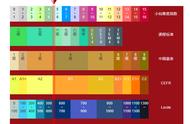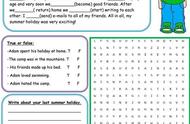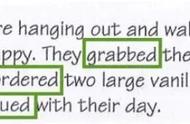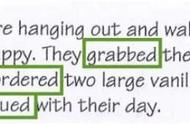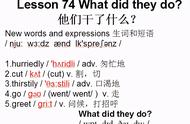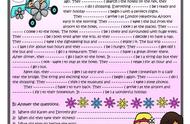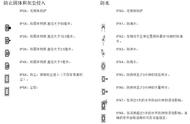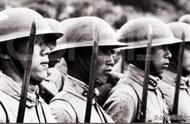今天这篇文章的难度如果看起来还费劲,你英语上应该多下功夫了!
* 用英语自身来理解和学习英语是最好的方式,这一系列的文章力求帮助大家在英语阅读能力上有所提升,并树立英语思维;
* 推荐的阅读的方法是:先原文,适当看解析阅读,实在不行再看双语对照。
* 解析中英语单词的音标使用Dictcom和IPA双音标标注,如果需要了解Dictcom音标,请参看我们的《dictionary.com所用的音标体系》一文。
* 本篇文章难度系数3.8,由《小仙英语伴读》人工智能难度分析系统提供评分。

Summer Job
【译】暑期的工作
【单词】job [job][dʒɒb] n. 工作;职业;职位;(一项)任务;活儿

It was the beginning of summer.
【译】那是夏天的开始。
【单词】beginning 原型:begin 动名词 [bih-'gin][bɪ'ɡɪn] v. 开始;着手
David Lopez's dad wanted him to get a summer job.
【译】大卫·洛佩兹的爸爸想让他找份暑期工作。
【单词】dad 名词 [dad][dæd] n. 爸爸
【专有名词】David ['dey-vid]['deɪvɪd] 戴维(男子名)
【专有名词】Lopez n. 洛佩斯(姓)
David had just finished school and was looking forward to enjoying his time off school.
【译】大卫刚放假,盼望着能享受假期远离校园的时光。
【短语】look forward to:期待,盼望。这里面to是介词,后面接名词或者动名词。如:1. I look forward to your good news.我等待你的好消息。2. I am looking forward to hearing from you. 我期待您的消息。
【单词】finished 原型:finish 动词过去式 ['fin-ish]['fɪnɪʃ] v. 完成;结束;最后加工;用完 n. 结束;完成;最后一层涂饰
【单词】enjoying 原型:enjoy 动词现在进行式或动名词 [en-'joi][ɪn'dʒɔɪ] v. 享受;喜欢
He wanted to sleep late, he wanted to play video games, and he wanted to spend time with his friends.
【译】他想睡到很晚,想玩电子游戏,想和朋友们在一起。
【短语】make friends 表示“交朋友”,后常与with搭配,表示“与……交朋友”。如:We need to encourage our children to make friends with people who will pull them up instead of drag them down.
【单词】sleep 动词原形 [sleep][sliːp] v. 睡觉 n. 睡眠;睡觉
【单词】spend 动词原形 [spend][spend] n. 预算;花销 v. 花费;浪费;度过;用尽(气力等)
David's dad decided that he would get a job for David.
【译】大卫的爸爸决定给大卫找份工作。
【单词】decided 原型:decide 动词过去式 [dih-'sahyd][dɪ'saɪd] v. 决定;判断;断定
When he came home, he handed David a uniform for the Burger Hut.
【译】当他回家时,他递给大卫一套汉堡店的制服。
【单词】uniform 名词 ['yoo-nuh-fawrm]['juːnɪfɔːm] n. 制服 adj. 一致的;统一的
【专有名词】Burger ['bur-ger]['bɜːɡə(r)] n. 【C】汉堡包 Hut [huht][hʌt] n. 小屋;棚屋 v. 在棚屋中隐蔽。Burger Hut是一家汉堡店的名字。
David was sad because he didn't want to work at the Burger Hut.
【译】大卫很伤心,因为他不想在汉堡店工作。
【单词】sad 形容词 [sad][sæd] adj. 悲哀的;忧愁的;伤心的
He knew all of his friends went there, and he knew that his friends would make fun of him.
【译】他知道他所有的朋友都去了那里,他知道他的朋友们会取笑他。
【单词】fun 形容词 [fuhn][fʌn] n. 乐趣;玩笑 adj. 有趣的
David knew that his dad was able to get him this job because the owner was his dad's friend.
【译】大卫知道他爸爸能给他这份工作,因为老板是他爸爸的朋友。
【固定用法】be able to do sth. 能够,会(做);有能力(或办法、机会)做某事;例句:I am able to pick you up on the short wave radio. 我能用短波收音机收听到你的信号。
【单词】owner 名词 ['oh-ner]['əʊnə] n. 所有人;物主
The owner's name is Michael.
【译】店主叫迈克尔。
【专有名词】Michael 人名/人物 ['mahy-kuh l]['maɪkəl] n. 迈克尔(男子名)
David didn't really like him that much.
【译】大卫不太喜欢他。
David had the first day at work.
【译】大卫第一天上班。
Everyone that worked at the Burger Hut had to wear a hat.
【译】每个在汉堡店工作的人都得戴帽子。
【单词】wear 名词 [wair][weə] v. 磨损;穿戴;使疲劳 n. 磨损;穿着;耐久性
【单词】hat 名词 [hat][hæt] n. 帽子 vt. 给 ... 戴帽子 vi. 提供帽子;制造帽子
David's hat fell into the oil where they made the fries.
【译】大卫的帽子掉到他们做薯条的地方了。
【短语】fall into 落入;分成;例句:You will fall into contempt by such foolish behaviour. 如此愚蠢的举止会使你受人轻视。We rescued the boy who fell into the river. 我们救起了掉进河里的小孩。
【单词】fries 原型:fry 名词复数形式 [frahy][fraɪ] v. 油煎;油炸 n. <美>法式炸薯条
Michael had to get it out with a big spoon.
【译】迈克尔不得不用大勺子把它拿出来。
【用法】have to do sth. 表示“必须”、“不得不”、“只好”、“(被迫)很勉强”去做某事,后面跟动词原形,与情态动词 must 近义但区别在于:have to 表示客观的需要,must 表示说话人主观上的看法,既主观上的必要。例句:My brother was very ill, so I had to call the doctor in the middle of the night. 我弟弟病得很厉害,我只得半夜里把医生请来。(客观上需要做这件事) He said that they must work hard. 他说他们必须努力工作。(主观上要做这件事)
【单词】spoon 名词 [spoon][spuːn] n. 匙;调羹;匙状物 vt. 以匙舀起 vi. 调情

After a week had passed by, David seemed to be getting used to working at the Burger Hut.
【译】一周过去了,大卫似乎已经习惯了在汉堡店工作。
【单词】passed 原型:pass 动词过去分词 [pas, pahs][pɑːs] v. 通过;经过;度过;传递;发生 n. 通行证;及格;乘车券;传球;关隘,山口
Michael was impressed with how hard David worked, and told him he could take a day off.
【译】迈克尔对大卫的努力工作印象深刻,并告诉他可以请一天假。
【单词】impressed 原型:impress 动词过去分词 [verb im-'pres; noun 'im-pres][ɪm'pres] n. 印记;印象;特征 v. 使 ... 有印象;影响;印刻;传送
During his day off, David went out with his friends.
【译】在休息日,大卫和他的朋友们出去了。
They went to the park and played some basketball, and then his friends decided to go get something to eat.
【译】他们去公园打篮球,然后他的朋友们决定去吃点东西。
【单词】basketball 名词 ['bas-kit-bawl, 'bah-skit-]['bɑːskɪtbɔːl] n. 篮球
【单词】eat 动词原形 [eet][iːt] v. 吃;吃饭;喝
David asked them where they wanted to go.
【译】大卫问他们想去哪里。
They said they wanted to go eat at the Burger Hut.
【译】他们说他们想去汉堡店吃饭。
【单词】eat 动词一般现在时(除第三人称单数) [eet][iːt] v. 吃;吃饭;喝
David tried to convince them to go somewhere else, but his friends really wanted to go to the Burger Hut.
【译】大卫试图说服他们去别的地方,但他的朋友们真的很想去汉堡店。
【单词】convince 动词原形 [kuhn-'vins][kən'vɪns] vt. 使确信;使信服;说服
【单词】somewhere 名词 ['suhm-hwair, -wair]['sʌmweə] adv. 在某处;到某种程度;大约 n. 某处
When they got to the Burger Hut, David put on his sweater and his hat.
【译】当他们到达汉堡店时,大卫穿上了他的毛衣和帽子。
【单词】sweater 名词 ['swet-er]['swetə] n. 毛衣;出汗者
He sat down in the far corner of the restaurant, and tried to hide himself from his co-workers and his boss.
【译】他在餐厅的另一个角落坐下,试图躲开同事和老板。
【单词】sat 原型:sit 动词过去式 [sit][sɪt] v. 坐;栖息;使就座 n. 坐;栖息
【单词】corner 名词 ['kawr-ner]['kɔːnə] n. 角落;转角;困境 v. 将 ... 逼入困境;转弯;垄断 adj. 位于角落的
【单词】restaurant 名词 ['res-ter-uh nt, -tuh-rahnt, -trahnt]['restrɒnt] n. 餐馆;饭店
【单词】hide 动词原形 [hahyd][haɪd] v. 藏;隐瞒;遮避 vt. 鞭打 n. 兽皮 hid hidden /
【单词】co-workers 原型:co-worker 名词复数形式 n. 合作者;同事,同僚
【单词】boss 名词复数形式 [baws, bos][bɒs] n. 老板;上司;首脑 v. 管理;指挥
When his friends got their food, they went to sit down with David.
【译】他的朋友们得到食物后,就去和大卫坐在一起。
【单词】sit 动词原形 [sit][sɪt] v. 坐;栖息;使就座 n. 坐;栖息
Michael came out and saw David.
【译】迈克尔出来看见大卫。
He went up to him and said, "You just can't get enough of this place, huh, David?"
【译】他走到他跟前说:“你就是受不了这个地方,嗯,大卫?”
【单词】huh 语气词 [huh][hʌ] int. 哼! 哈! (表示轻蔑、吃惊或疑问)
Michael chuckled and then left.
【译】迈克尔笑了,然后离开了。
【单词】chuckled 原型:chuckle 动词过去式 ['chuhk-uh l]['tʃʌkl] v. 轻声笑;咯咯笑;暗自笑 n. 轻声笑;咯咯笑
David's friends took a bite out of their burgers, and looked at David.
【译】大卫的朋友们咬了一口汉堡,看着大卫。
【单词】bite 名词 [bahyt][baɪt] v. 咬;叮;蜇 n. 咬;一口;(被咬的)伤痕 bitable biter bit bitten /
【单词】burgers 原型:burger 名词复数形式 ['bur-ger]['bɜːɡə] n. 【C】汉堡包
"You work here?"
【译】“你在这里工作?”
One of David's friend asked.
【译】大卫的一个朋友问。

His another friend looked at him and said, "Can you get me a job?"
【译】他的另一个朋友看着他说:“你能给我找份工作吗?”
David smiled and nervously said, "I'll try."
【译】大卫笑了笑,紧张地说:“我试试看。”
【单词】smiled 原型:smile 动词过去式 [smahyl][smaɪl] n. 微笑;笑容 v. 微笑;露出笑容
【单词】nervously 副词 ['nur-vuhs]['nɜːvəsli] adv. 神经质地;焦急地

